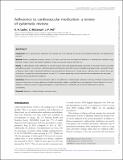Files in this item
Adherence to cardiovascular medication : a review of systematic reviews
Item metadata
| dc.contributor.author | Leslie, K.H. | |
| dc.contributor.author | McCowan, C. | |
| dc.contributor.author | Pell, J.P. | |
| dc.date.accessioned | 2019-02-01T12:30:05Z | |
| dc.date.available | 2019-02-01T12:30:05Z | |
| dc.date.issued | 2018-05-29 | |
| dc.identifier | 257573315 | |
| dc.identifier | 9cb6aa5f-2b06-4260-bbce-5720109319f2 | |
| dc.identifier | 85063679155 | |
| dc.identifier.citation | Leslie , K H , McCowan , C & Pell , J P 2018 , ' Adherence to cardiovascular medication : a review of systematic reviews ' , Journal of Public Health . https://doi.org/10.1093/pubmed/fdy088 | en |
| dc.identifier.issn | 1741-3842 | |
| dc.identifier.other | Bibtex: urn:0471f900d7be6a81c331cc643b97fa8e | |
| dc.identifier.uri | https://hdl.handle.net/10023/16984 | |
| dc.description | Work supported by Medical Research Council (MRC) [MR/N013166/1 to K.H.L.] | en |
| dc.description.abstract | Background: Use of cardiovascular medication has increased over time, especially for primary and secondary prevention, with polypharmacy common. Methods: Review of published systematic reviews of the factors and outcomes associated with adherence to cardiovascular medication using MEDLINE, Embase, CINAHL and PsycINFO databases. Quality was assessed using the AMSTAR tool. Results: Of 789 systematic reviews identified, 45 met the inclusion criteria and passed the quality assessment; 34 focused on factors associated with adherence, and 11 on outcomes. High heterogeneity, both between and within reviews, precluded meta-analysis and so a pooled estimate of adherence levels could not be derived. Adherence was associated with disease factors, therapy factors, healthcare factors, patient factors and social factors, though with some inconsistencies. In total, 91% of reviews addressing outcomes reported that low adherence was associated with poorer clinical and economic endpoints. Conclusions: Factors from across five key domains relate to non-adherence to cardiovascular medications, and may contribute to poorer clinical outcomes. Interventions to improve adherence should be developed to address modifiable factors and targeted at those at highest risk of non-adherence. Adherence research is highly heterogeneous to-date and efforts to standardize this should be implemented to improve comparability. | |
| dc.format.extent | 11 | |
| dc.format.extent | 330266 | |
| dc.language.iso | eng | |
| dc.relation.ispartof | Journal of Public Health | en |
| dc.subject | Behaviour | en |
| dc.subject | Circulatory disease | en |
| dc.subject | Systematic review | en |
| dc.subject | RA0421 Public health. Hygiene. Preventive Medicine | en |
| dc.subject | ZA4050 Electronic information resources | en |
| dc.subject | SDG 3 - Good Health and Well-being | en |
| dc.subject.lcc | RA0421 | en |
| dc.subject.lcc | ZA4050 | en |
| dc.title | Adherence to cardiovascular medication : a review of systematic reviews | en |
| dc.type | Journal item | en |
| dc.contributor.institution | University of St Andrews. School of Medicine | en |
| dc.identifier.doi | 10.1093/pubmed/fdy088 | |
| dc.description.status | Peer reviewed | en |
| dc.identifier.url | http://eprints.gla.ac.uk/161670/ | en |
This item appears in the following Collection(s)
Items in the St Andrews Research Repository are protected by copyright, with all rights reserved, unless otherwise indicated.

